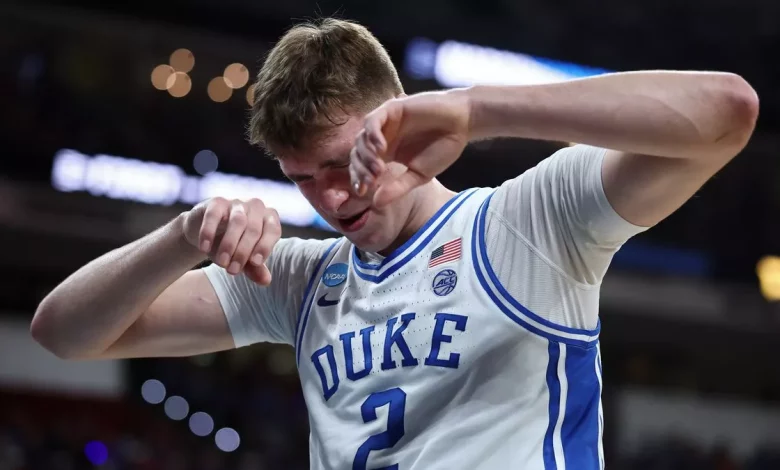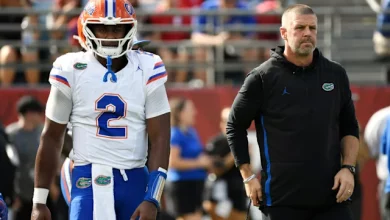Duke basketball’s March Madness secret weapon isn’t Cooper Flagg, it’s vulnerability

In the world of college basketball, where dynasties rise and fall, one name consistently emerges from the shadows of March Madness: Duke University. Known for its illustrious program under the leadership of Coach Mike Krzyzewski, and now under Jon Scheyer, Duke has long been considered a perennial contender for the NCAA Championship. But as we head into another March Madness, it’s not the arrival of a single superstar or a dominant player like Cooper Flagg that will serve as Duke’s secret weapon. Instead, it’s vulnerability—a characteristic that, when embraced and understood, can turn a team from being just another contender into a truly formidable champion.
The Myth of Invincibility
For many years, Duke basketball has been synonymous with invincibility. With future NBA stars like Zion Williamson, RJ Barrett, and Jayson Tatum emerging from its ranks, it’s easy to see why the Blue Devils have earned a reputation as a powerhouse. However, as time progresses, Duke’s success has shown that invincibility is a myth. The 2015 national title is a prime example of a championship that was achieved not with perfection, but with a team that was, in many ways, vulnerable. The road to the title that year wasn’t paved with seamless performances; it was a tournament where flaws were evident, yet the team found ways to adapt and overcome them.
This season, the vulnerability within the Duke program is evident once again. However, this time, it’s not just about the flaws within the team, but about how they acknowledge them and use these weaknesses to fuel their growth. It’s no longer about avoiding mistakes or playing perfect basketball—Duke is embracing vulnerability as a strength.
Embracing Vulnerability
To understand why vulnerability is such a powerful secret weapon, we must first understand what vulnerability in sports really means. Vulnerability, in the context of March Madness, is not a weakness but an acceptance of imperfection and an ability to grow from it. It’s about recognizing that the road to success isn’t linear, and that setbacks are inevitable. For a team like Duke, which has long been defined by its relentless pursuit of excellence, embracing vulnerability can provide the mental fortitude needed to win when it matters most.
Jon Scheyer, Duke’s current head coach, has shown that he understands the importance of vulnerability. As a player, Scheyer was not the most physically dominant athlete on the floor, but his basketball IQ, resilience, and ability to adapt to challenges set him apart. These qualities have clearly influenced his coaching style, where he encourages his players to embrace mistakes, learn from them, and evolve. This approach has created an environment in which the Blue Devils can freely confront their weaknesses, a crucial factor when navigating the chaos of March Madness.
The Role of Leadership and Culture
Vulnerability is most powerful when it is embraced by leadership. Scheyer, with his unique blend of humility and competitive drive, instills this mindset in his players. Instead of hiding behind a facade of perfection, Duke’s current players are encouraged to be authentic—to acknowledge their mistakes and use them as stepping stones rather than stumbling blocks. This attitude has shaped the team’s culture in profound ways, creating a group that is mentally tough and highly adaptable.
One of the key components of this culture is how Duke handles adversity. The team has faced several moments of struggle this season, from key injuries to unexpected losses. Rather than being demoralized, the Blue Devils have consistently bounced back, finding new ways to win despite their vulnerabilities. Whether it’s through the leadership of veterans or the adaptability of younger players, Duke has shown that its strength lies in its ability to respond to adversity with resilience and composure.
The Impact of Vulnerability on Player Development
The embrace of vulnerability has also played a pivotal role in the development of individual players. While Cooper Flagg, one of the most highly touted prospects in recent memory, is certainly a key figure on the team, his presence alone is not what will make or break Duke’s March Madness run. What will matter more is how Flagg and his teammates respond to the inevitable challenges they will face. It’s one thing to be a top prospect on paper; it’s another to handle the pressure and intensity that comes with playing on the biggest stage in college basketball.
Players like Tyrese Proctor, Jeremy Roach, and Kyle Filipowski are examples of individuals who have been shaped by their vulnerabilities. Proctor, for instance, has grown significantly this season, improving his shooting and decision-making, and is now a major threat on both ends of the floor. His ability to confront his early-season struggles head-on has made him a more well-rounded player and a crucial part of Duke’s title hopes.
Similarly, Filipowski, who has had his fair share of ups and downs, has learned to refine his game by accepting that his flaws don’t define him. He has developed into one of the most versatile players in college basketball, capable of impacting the game in multiple ways. His journey reflects how vulnerability—acknowledging where improvement is needed and working relentlessly to address it—can lead to exponential growth.
The Tactical Advantage of Vulnerability
On the court, vulnerability translates into adaptability. March Madness is notorious for its unpredictability, and teams that have the ability to adjust on the fly are often the ones that make deep runs. Duke’s vulnerabilities this season—whether it’s their youth, inexperience, or moments of inconsistency—force the team to adjust their strategies and find creative solutions to win games. This flexibility is a tactical advantage that many other teams, particularly those that are less accustomed to facing adversity, may not possess.
Duke’s ability to change gears depending on the opponent is another aspect where vulnerability becomes a strength. Coach Scheyer’s ability to exploit matchups and adjust rotations in real-time ensures that his team remains unpredictable and difficult to game-plan against. In a tournament where anything can happen, having the capability to pivot, to find new ways to win, is often the difference between advancing or going home early.
The Psychological Edge
March Madness is as much a mental battle as it is a physical one, and vulnerability offers a psychological edge over opponents. While many teams may crumble under pressure, Duke has developed the psychological resilience to push through difficult moments. The team’s willingness to confront their vulnerabilities head-on makes them more mentally prepared for the emotional rollercoaster of the tournament.
This mental fortitude is particularly important when facing teams with less experience in high-stakes games. For instance, many of the Blue Devils’ potential opponents in the tournament will be players who have not faced the intense spotlight that Duke’s roster is accustomed to. For players like Filipowski and Roach, March Madness is just another stage, another challenge to overcome. Their familiarity with high-pressure situations—paired with the collective mindset of embracing vulnerability—gives Duke an edge in the psychological aspect of the game.
The Importance of a Team-Oriented Approach
While individual talent is crucial in March Madness, it is often the collective strength of a team that carries them to victory. Duke’s ability to lean into vulnerability as a unit fosters a sense of togetherness and trust that is essential in a tournament where every game could be your last. The Blue Devils are not just playing for themselves; they are playing for each other, knowing that their individual weaknesses will be covered by the strength of the collective.
The leadership of Roach, a player who has experienced the highs and lows of college basketball, has been instrumental in creating this team-first mentality. His ability to guide the younger players, while also being vulnerable himself in admitting his shortcomings, has set the tone for the entire program. This sense of shared vulnerability creates a bond that can be incredibly powerful in high-pressure moments.









